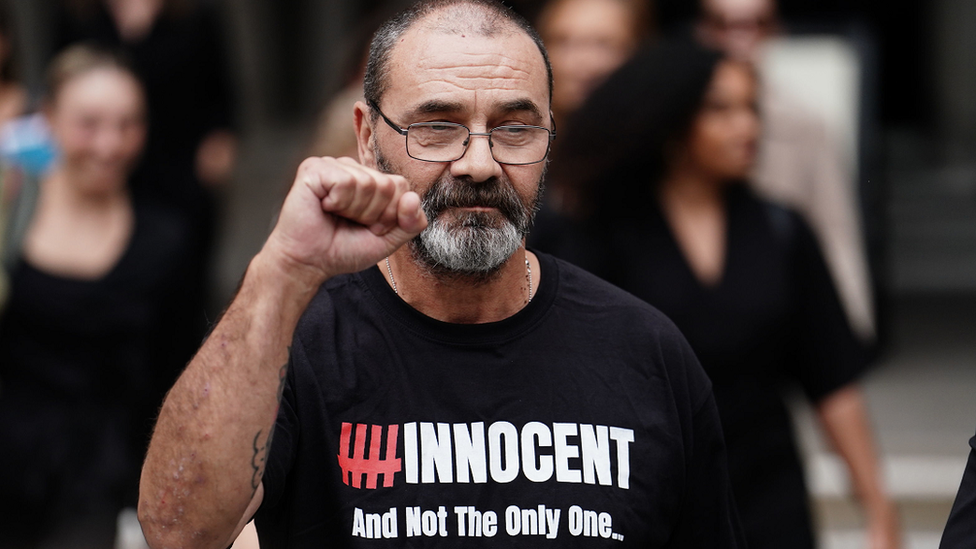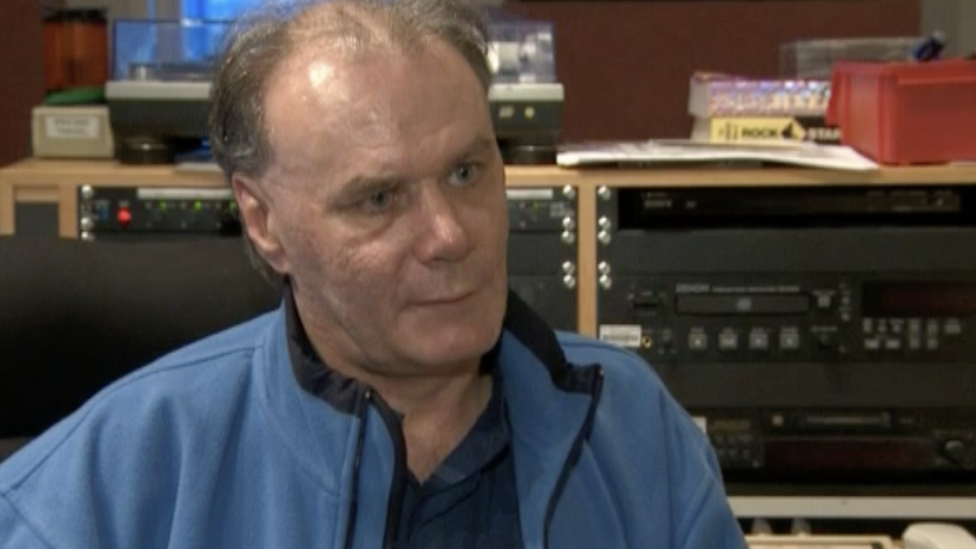Andy Malkinson: DNA warnings made years before rape case overturned
- Published

Andy Malkinson was wrongfully convicted, in 2004, of raping a woman in Greater Manchester
The body that investigates potential wrongful convictions was warned it could have missed critical DNA evidence in rape cases, a year after first rejecting Andy Malkinson's appeal.
The warning came in 2013, when a review of a similar case recommended the Criminal Cases Review Commission (CCRC) look again at files for DNA leads.
Mr Malkinson's rape conviction was not overturned until a decade later.
His lawyers say the report is evidence he could have been exonerated earlier.
The CCRC investigates potential wrongful convictions in England and Wales for judges to overturn.
Mr Malkinson is now calling for Helen Pitcher, who chairs it, to be sacked and stripped of her OBE.
She has offered to meet him, once two independent inquiries have reported back.
Major inquiry
Mr Malkinson was accused of a near-fatal rape in Greater Manchester in 2003 and jailed for life the following year on now wholly discredited eyewitness evidence.
The Court of Appeal quashed his conviction last July, thanks to DNA evidence discovered three years after Mr Malkinson was jailed.
A major inquiry is now looking at how Greater Manchester Police, the Crown Prosecution Service and CCRC handled the case.
A further internal CCRC inquiry, by a senior barrister, is expected to complete shortly.
The internal CCRC document raising the fresh questions concerns its handling of the case of Victor Nealon, convicted of rape in 1997 in strikingly similar circumstances to Mr Malkinson.
Both men spent 17 years in jail maintaining their innocence - and there was no forensic evidence to link either to the crime.
Court of Appeal judges quashed Mr Nealon's conviction in 2013, after being told another man's DNA could be linked to the victim.
The previously unseen CCRC's review reveals the DNA evidence in Mr Nealon's case was first "discoverable" 10 years before he was exonerated.

Mr Nealon was exonerated in similar circumstances to Mr Malkinson
The report concludes CCRC case workers "overlooked" advances in DNA technology - and it would have been "reasonable" for them to have asked scientists in 2003 to retest for leads.
"There is nothing in the file to suggest that the possibility of forensic testing was given any detailed consideration during the [second] review," the report's author wrote.
"The commission should also consider the possibility of a trawl for similar cases."
The timing of that recommendation is highly significant for the CCRC's handling of Mr Malkinson's case.
As Mr Nealon was being freed by the Court of Appeal, Mr Malkinson was spending his 10th year in jail.
The CCRC had rejected his case in 2012, despite knowing there was an unknown man's DNA on Mr Malkinson's purported victim's clothes.
Assurances given
Mark Newby, Victor Nealon's solicitor told the BBC that in 2014 the CCRC had promised that the lessons from that case would be learned.
"They were giving this impression to Victor Nealon that they were going to do everything to make sure no one else suffered what he'd suffered," said Mr Newby.
"I've no evidence to indicate that the Commission at any point really did that. And the obvious example of that is Andy Malkinson's case."
'Learnt nothing'
Mr Malkinson said the CCRC's failure to review his case in 2013 amounted to "serious corporate failure".
"The body's chair Helen Pitcher still refuses to apologise to me," he said.
"She should be sacked and stripped of her OBE.
"New scientific discoveries are made every day, yet it did not even occur to the CCRC to use new DNA advances to spare myself and Victor Nealon extra years wrongly imprisoned."
James Burley, the investigator at Appeal, the legal charity that proved Mr Malkinson was innocent, obtained the Nealon document under Freedom of Information laws.
"This report reveals the CCRC effectively learnt nothing from its failure to properly investigate Victor Nealon's wrongful conviction - and Andy Malkinson paid the price," he said.
"The CCRC's report concluded with a 'high degree of confidence' that what happened to Victor Nealon could not happen again. Yet it did."
'Profound impact'
The CCRC's review of the decisions it took in Mr Malkinson's case could be published within weeks.
A much wider judge-led inquiry, launched by the government, will take much longer.
A CCRC official said: "While the review and the inquiry are ongoing, it would not be appropriate for us to engage in a detailed discussion.
"We are committed to maintaining the integrity of the inquiry process and to preserving the impartiality of the conclusions.
"CCRC chairman Helen Pitcher OBE has previously acknowledged the profound impact that Mr Malkinson's wrongful conviction has had on his life and the unacceptable time he spent in prison for a crime he did not commit.
"She has offered to meet Mr Malkinson once the Henley Review and independent inquiry have been concluded."
